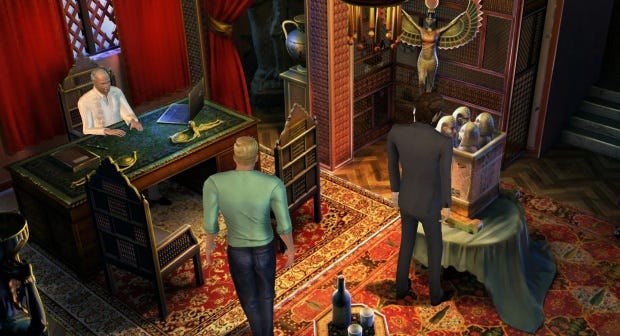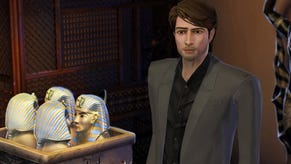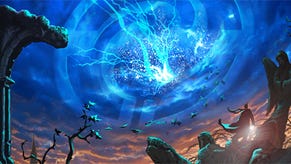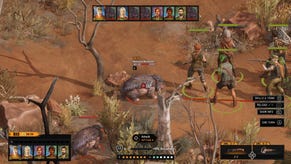Wot I Think: Moebius
Here we go again
One of the higher profile Kickstarters in the Great Wave of 2012 was Gabriel Knight creator Jane Jensen's half-million pot for her new Pinkerton Road Studio. The first project to emerge from this, in collaboration with Phoenix Online, is Moebius: Empire Rising. A brand new adventure game featuring a genius antiques dealer and a worldwide, history-spanning mystery. Is it any good? Spoiler: No, it's astonishingly terrible. Here's wot I think:
Moebius wasn’t so much an emotional rollercoaster as an emotional fall down a hole. I went from mildly interested, to laughing at how stupid it is, to hating it with a fiery passion. You find me in that latter mode, now the achingly long, tedious adventure is finally over.
What begins as a distracting, almost charmingly old-school point and click adventure quickly dives into a humourless farce, before finding its groove as the most pedantic, tiresome and misanthropic slog in a good long year.
I’ll say one thing for the storytelling in Moebius – it’s cleverly structured such that the full extent of how brain-punchingly stupid it is comes too far in, such that it has to be considered a spoiler. Cunning.
But here’s what I can safely tell. You mostly play as the ludicrously named Malachi Rector (I couldn’t tell if the homonym of “Mr Rector”/”Misdirector” was deliberate, but considering everything else in the plot this would seem an optimistic reach), a New York-based British antiques expert with a purported IQ of 170, a photographic memory, and the personality of a spoilt turd. This is a man – and I promise this is true – whose psychology is based on his mother’s being eaten by a lion in front of him when he was a child.
Rector has a special talent for being able to recognise the traits of a person, and when prompted by a mysterious secret government organisation (with a prominent logo in the entrance of their grand offices), finds he can compare people to his cranial archive of historic figures. No! Don’t be silly! It’s not true that absolutely everyone on Earth can see if cherry-picked elements of a person’s life are vaguely similar to someone else from off of history! ONLY MALACHI.
While in Egypt, taking a look at a potentially ancient relic for a client, Malachi bumps into David Walker, an American ex-Special Forces chap with the personality of a thinly sketched game character that no one really bothered developing. The two click, and Rector recognises that Walker would be a good bodyguard to accompany him in the dangerous world of antiques appraisal.
And so begin their adventures, as they attempt to identify a woman who might be a bit like some other woman from history, for a reason so stupid that upon its reveal my brain crawled out of my head, into a corner, and shot itself. And indeed so begins the most garish, clumsy attempt at a will-they-won’t-they between the two male leads, that reads like the most prudish slash fiction ever written.
Moebius appears to hold contempt for both men and women, which it exhibits in alternating sequences of patronising sexism. Men, in this game, are controlling, emotionless bastards, who find women stupid and contemptible. Women generously comply, by being portrayed as either astonishingly spiteful and vain (a favourite descriptive word of the game) or feeble and useless. As you jet around the world condemning everyone you meet on first glance, Moebius exists in a universe of the uniquely ghastly.
I say this as someone who genuinely enjoys well-crafted misanthropic leads. Give me a Gregory House or Patrick Jane any day. I’m loving what Jonny Lee Miller is doing with Holmes. But for it to work, two things have to be nailed. First, they have to actually be cleverer than everyone else. Second, they need to be more than a broomstick, mop head on top, with a glued on paper plate face. Malachi Rector is neither. There is no moment in the entire game when he demonstrates his brilliant mind – instead he is a deeply mundane person, whose only seeming talent is to know a bit about antiquities.
There’s a flailing attempt to gamify that favourite thing of all Holmesian characters – to quickly piece together a person based on observable clues. Look at a character, click on the brain icon, and you get a screen in which you make facile judgements of them based on nothing other than guessing. A drop down menu will appear offering three guesses for three or four aspects of a person, and once you’ve randomly selected them all correctly the game will declare that yes, this is the fourth woman you meet who is instantly dismissed as vain, jealous and bitter. I generally found the way to get these right first time was to be as contemptuous about them as possible.
The other gimmicky feature ties into Malachi’s extraordinary and unique ability to notice that a person has stuff in common with another person. As you investigate people, you gather “data points” about them. Revelations like “they have a brother” or “their parents were rich”, and then in an existential version of Guess Who, you eliminate a cluster of historical or mythical figures because they had a sister, or their parents weren’t rich. These sequences are horribly ambiguous, and very poorly delivered, making what is meant to be the game’s main hook its largest pain in the arse.
This charmless, clumsy mess can’t fall back on its looks, either. The sterile presentation is made ridiculous thanks to what looks like placeholder animations. Legs bend and stretch in hilariously painful ways, feet sink into floors, and everyone looks like their joints are constantly dislocating. And it’s so damned slow. Everyone moves like they’re at the bottom of a glue-filled swimming pool, including your mouse cursor, that for no given reasons will vanish for random lengths of time. While you can mercifully double-click to teleport around scenes, or jump to exits, you’ll still be punished by having to watch a slow-motion arrival into the next. Then the cursor will go. Then Malachi will go into his aching pill-taking animation.
It also manages to throw a new twist on inventory puzzle horror. While there are still idiotic random-on-random nonsenses, like using the florist putty on the window pole to retrieve the hook from the bottom of the river (no, I swear), here they double-down on the stupid by refusing to let you pick up objects before their abstract purpose has become a need. Yes, in some ways it’s more realistic that someone wouldn’t pick up the scissors in the kitchen before they knew they needed to cut something. But when almost every item’s eventual use is so disingenuous, it makes the process utterly agonising. So many times I thought I’d reached a dead end, because a tiny object Rector said he didn’t need five screens ago was then deemed vital for an undeclared purpose. Even worse, it does this with locations too. One puzzle near the end of the game required magically knowing Malachi would now go into a bar in a city in another state that he had adamantly refused to enter at every other point in the game, including only moments earlier in the same chapter.
One puzzle requires you to bribe an explicitly teenage girl to bend over such that her arse will distract an adult man while you steal from him. Another requires you to bestow a woman with empty gestures and gifts until she’s interested in sleeping with you, whereupon the only correct solution to the following sequence is to horrifically threaten to murder her with a knife, in possibly the most ill-advised scene I’ve seen in a long time.
Another puzzle requires seeing a vital email, where you have access to both the sender and recipient. The recipient refuses to let you, but when you visit the sender the game hasn’t even thought of that as a potential solution, and there’s no conversation option to ask. In fact, this sort of thing is rife throughout, where blatant solutions aren’t even considered. And then, in the final third, as a nice surprise it introduces fail-based game overs!
If your adventure game is barely coherent, it’s best to avoid killing the character at random. That’s a tip there. And so random. Right near the very end, opening a gate near a hole triggers a sequence where the game takes over, forces your characters to walk through, climb down the hole, and then kills you at the bottom. The game over screen informs you that you ought to have prevented yourself from being followed. ALL I DID WAS OPEN A GATE!
Moebius is an utter disaster of a game. An entirely unlikeable or vacuous cast, a contempt for women like I’ve never seen, and indeed almost equal contempt for men, gibberish puzzles, ghastly animation, flawed conceits, the stupidest plot idea I can remember, and the whole thing scored with lift music. It’s as if the moustache puzzle from Gabriel Knight 3 got an agent, and a starring role as an entire game.





















